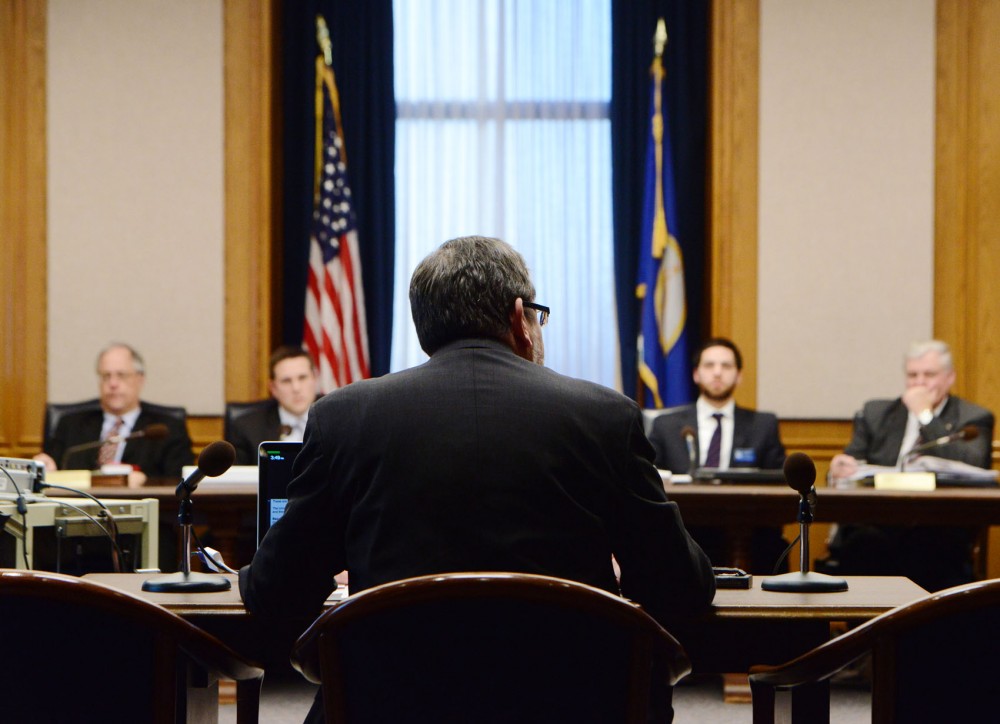With a predicted state budget shortfall of $1.1 billion and criticisms about administrative costs, the University of Minnesota has had a notable presence during the first couple weeks of the 2013 state legislative session.
The University has approached lawmakers with visions and research, but the top priority is drumming up support for President Eric Kaler’s billion-plus budget proposal that would offer a tuition freeze in exchange for more state funding.
After the University was an example of administrative bloat in a Wall Street Journal article in late December, the school has faced scrutiny from legislators, media and citizens.
“I am not interested in the status quo,” Kaler said Jan. 15 to the Senate Higher Education and Workforce Development Committee. “I’m not interested in apologizing for what is here or talking about why that’s OK.”
Kaler testified in front of the committee outlining the University’s visions and expressing his dismay with the “inaccurate” Journal article.
Sen. Terri Bonoff, D-Minnetonka, who chairs the committee, said legislators don’t want “to point fingers” but rather focus on providing education to more students, making it more affordable and accessible by “driving dollars out of delivery and into
students’ and families’ hands.”
At the Senate committee, Bonoff said she asked Kaler to address the committee right away at their first meeting so the Journal article “doesn’t remain like this looming thing that we’re all waiting to deal with.”
Two days after Kaler presented, the University’s Senior Vice President for Academic Affairs and Provost Karen Hanson presented a performance and accountability report for the committee that explained the University’s accomplishments, which was well received by some legislators.
“I’ve been impressed by the presentation by the president and yourself, and it seems like you’ve highlighted a lot of things that the University has done exceptionally well,” said Sen. Branden Peterson, R-Andover, at the meeting Thursday. “In fact, just about everything you’ve highlighted has been going exceptionally well.”
He said the “ability to speak to opportunity” in order to improve is a hallmark of an organization and he “hasn’t seen a whole lot of that.”
Hanson admitted the University needs to improve some areas and said the school is “not happy students are graduating with a great deal of student debt.”
Following Hanson, Chief Financial Officer Richard Pfutzenreuter explained the process of how the state’s money flows through the University and its need for it.
“We’re not here to bust up the myths around [the process],” Pfutzenreuter said.
Ranking minority member for the committee, Sen. Jeremy Miller, R-Winona, said he doesn’t think it’s the Legislature’s role to “micromanage” the budget but rather “hold the University accountable.”
“I think the recent media attention surrounding the articles on administrative costs present a great opportunity for you, the president of the University [and] Board of Regents, to really become more transparent with the budget and certainly administration costs,” Miller said to Pfutzenreuter.
“Transparency” was the theme in both meetings, and the policymakers and University officials talked openly about establishing a “strong partnership both ways” as they analyze the University’s funding and spending.
“We must keep the University accessible, and by ‘we’ I mean me and you,” Kaler said to the committee.
The University’s presence at the Capitol isn’t likely to cease anytime soon. Tuesday morning, the House Committee on Capital Investment will hear the University’s capital budget request for public infrastructure, as well as the Minnesota State College and University system’s request. Committee members will compare the two systems.
Most discussions, ranging from Kaler’s budget proposal to different capital investment decisions, will be revisited following Gov. Mark Dayton’s budget announcement Tuesday morning. He will propose his ideas for reshaping the state’s tax code and reforming spending for the 2014-15 biennium.
















